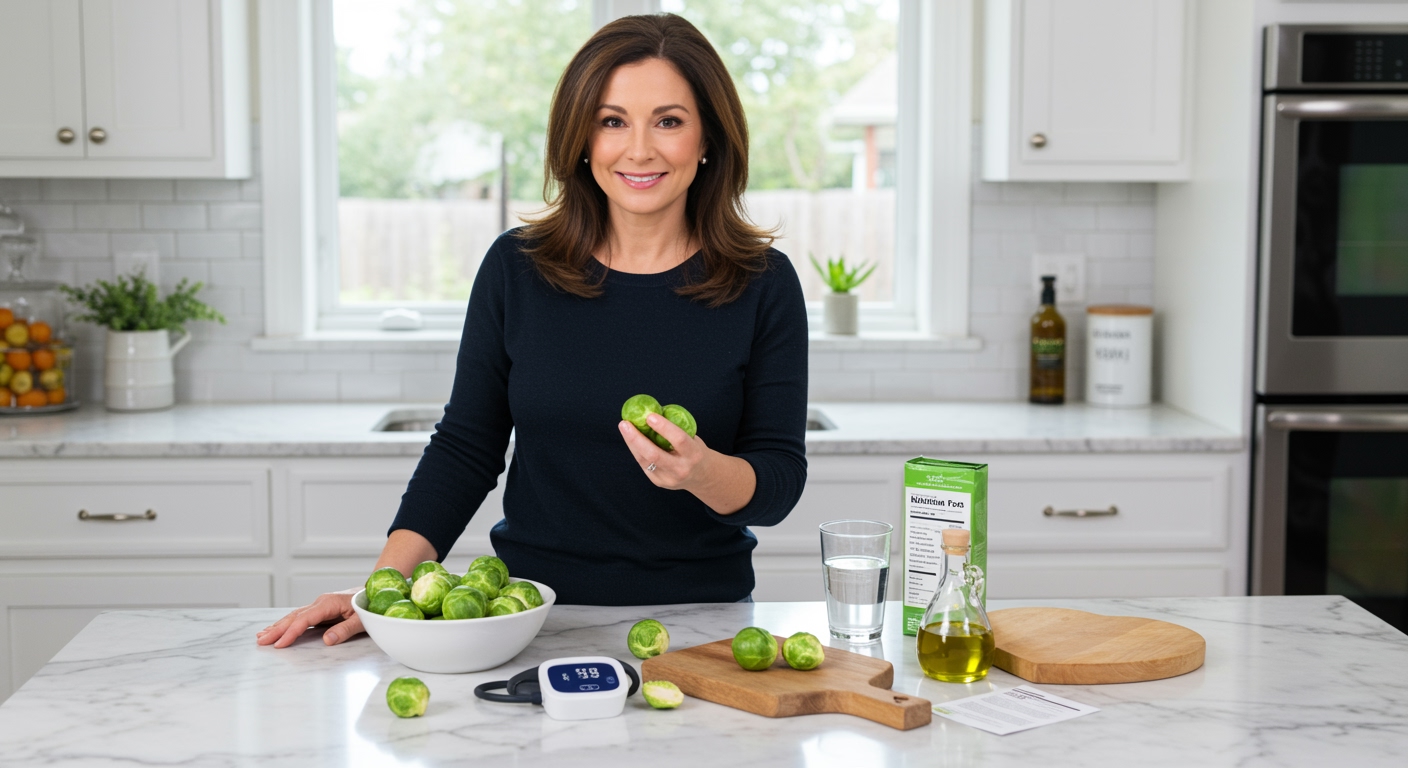✪ Key Takeaway: Brussels sprouts can help manage hypertension through potassium, fiber, and antioxidants that support healthy blood pressure.
Introduction
You walk down the grocery store aisle and see those small green vegetables that look like tiny cabbages.
Maybe you wonder if these Brussels sprouts could actually help with your blood pressure concerns or if they are just another overhyped superfood.
Hi, I am Abdur, your nutrition coach and today I am going to explain how Brussels sprouts can genuinely support your blood pressure management goals.
What Makes Brussels Sprouts Special for Blood Pressure?
Brussels sprouts contain a powerful combination of nutrients that work together to support healthy blood pressure levels.
One cup of cooked Brussels sprouts provides about 495 milligrams of potassium, which is roughly 14% of your daily needs.
Potassium acts like a natural blood pressure regulator by helping your kidneys remove excess sodium from your body.
When sodium levels drop, your blood vessels can relax and your heart does not have to work as hard to pump blood.
The fiber content in Brussels sprouts also plays a crucial role in cardiovascular health.
Research shows that people who eat more fiber tend to have lower blood pressure readings and reduced risk of heart disease.
✪ Fact: Brussels sprouts belong to the cruciferous vegetable family, which includes broccoli, cauliflower, and kale.
How Do Antioxidants in Brussels Sprouts Help?
Brussels sprouts are packed with antioxidants that protect your blood vessels from damage.
These vegetables contain high levels of vitamin C, with one cup providing over 100% of your daily requirement.
Vitamin C helps maintain the flexibility of your blood vessel walls, which is essential for healthy blood pressure.
The glucosinolates in Brussels sprouts break down into compounds called isothiocyanates during digestion.
These compounds have been shown to reduce inflammation in blood vessels and improve overall cardiovascular function.
Studies suggest that people who regularly eat cruciferous vegetables like Brussels sprouts have lower rates of hypertension.
✪ Pro Tip: Steam Brussels sprouts lightly to preserve their antioxidant content and maximize health benefits.
What Does the Research Say About Brussels Sprouts and Blood Pressure?
Scientific studies have examined the relationship between cruciferous vegetables and blood pressure management.
A study published in the American Journal of Clinical Nutrition found that people who ate more cruciferous vegetables had significantly lower blood pressure readings.
The research followed over 1,200 adults for several years and tracked their vegetable intake alongside their cardiovascular health markers.
Another study showed that the nitrates naturally found in Brussels sprouts can help improve blood flow.
When you eat Brussels sprouts, your body converts these nitrates into nitric oxide, which helps relax blood vessels.
This process can lead to improved circulation and reduced pressure on your cardiovascular system.
✪ Note: Individual results may vary, and Brussels sprouts work best as part of an overall healthy diet pattern.
How Much Brussels Sprouts Should You Eat for Blood Pressure Benefits?
You do not need to eat massive amounts of Brussels sprouts to see potential benefits for your blood pressure.
Most nutrition experts recommend eating 2-3 servings of cruciferous vegetables per week.
One serving equals about half a cup of cooked Brussels sprouts or one cup of raw Brussels sprouts.
The key is consistency rather than eating large amounts occasionally.
Your body benefits more from regular, moderate intake of these nutrients than from sporadic large portions.
Remember that Brussels sprouts work best when combined with other heart-healthy foods like leafy greens, berries, and whole grains.
✪ Pro Tip: Pair Brussels sprouts with healthy fats like olive oil to enhance absorption of fat-soluble vitamins.
Are There Any Concerns with Eating Brussels Sprouts for Blood Pressure?
Brussels sprouts are generally safe for most people, including those managing high blood pressure.
However, if you take blood thinning medications, you should talk to your doctor about your vitamin K intake.
Brussels sprouts contain vitamin K, which can affect how blood thinning medications work in your body.
Some people experience digestive discomfort when they suddenly increase their intake of cruciferous vegetables.
Start with smaller portions and gradually increase your intake to allow your digestive system to adjust.
The fiber content in Brussels sprouts is beneficial for most people, but it can cause gas or bloating if you are not used to eating high-fiber foods.
✪ Note: Always consult your healthcare provider before making significant dietary changes if you have existing health conditions.
The Bottom Line
Brussels sprouts can indeed help manage hypertension through their rich content of potassium, fiber, antioxidants, and other heart-healthy compounds.
Good nutrition is not about finding magic bullets but about building consistent healthy habits that support your body over time.
I would love to hear about your experience with Brussels sprouts or any questions you might have about incorporating them into your blood pressure management plan, so please share your thoughts in the comments below.
References
At NutritionCrown, we use quality and credible sources to ensure our content is accurate and trustworthy. Below are the sources referenced in creating this article:
- Harvard Health: Broccoli and Brussels sprouts may promote heart health
- Medical News Today: Brussels sprouts: Health benefits, nutrition, and tips
- PMC: Cruciferous vegetables and cardiovascular disease
- MedlinePlus: High blood pressure and diet





